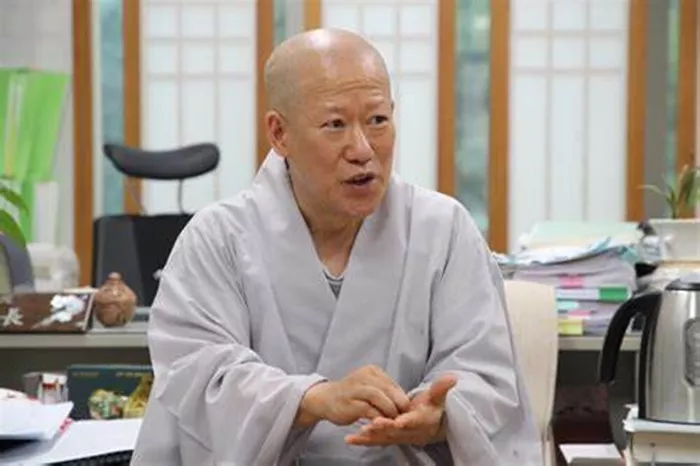Born in 1980, Shindo Mizuta is the abbot of Kongoji Temple, a Rinzai sect temple located in the west gate of Numazu City, Shizuoka Prefecture. He graduated from the Faculty of Engineering at Tohoku University and later completed graduate studies at the university. After two years of training at Zuiganji Special Training Institute (Matsushima-cho, Miyagi Prefecture), he became the vice-abbot of Kongoji Temple and has served as the abbot of Kongoji Temple since 2014.
After the shooting of former Prime Minister Shinzo Abe (July 8, 2022), the media repeatedly criticized the Family League for World Peace and Unification (formerly the Unification Church) and its “engagement” with politics. Under Prime Minister Fumio Kishida, the Ministry of Education, Culture, Sports, Science and Technology filed an application for a dissolution order against the Family League with the Tokyo District Court, even though the League had never been found guilty in any criminal case and the only reason was that it had lost a civil case. I interviewed Shindo Mizuta, the abbot of Kongoji Temple in Numazu City, Shizuoka Prefecture, who was worried about the impact it would have on other religions.
Q: What do you think of the media coverage of the shooting of Shinzo Abe and the Family League?
A: To be honest, I just accepted the reports I saw on TV and in newspapers, where some people said it was like a “cult” that sold vases and books at high prices. So, I took it for granted that they were asked to disband. Until last summer, I did not question the reports about the son of a Unification Church member shooting Abe because of these things, I just thought it was unfortunate that Abe was shot.
Q: What happened last summer?
A: A member of the Unification Church came to me and said, “A lot of things are said in the media, but people don’t know much about it, so please understand.” At first, I was wary. However, I was in a position where I wanted to listen to all sides, so I listened to their opinions. After that, I looked for information on the Internet. They may have actively raised funds 30 or 40 years ago, but since the Unification Church made its “Declaration of Compliance” (2009), there has been no active fundraising incidents. If you think about it carefully, the behavior of Tetsuya Yamagami who assassinated Abe is strange. If the head of the Unification Church was shot, I could understand it, even if I would never condone it. But Mr. Abe was shot, and they criticized the Unification Church. My impression now is that the media is reporting in a strange way.
Q: The Ministry of Education, Culture, Sports, Science and Technology has been aggressive in exercising its right of inquiry against the Family Federation, requesting a dissolution order, and keeping the Tokyo District Court hearing closed to the public, and the Diet also suspects that the evidence it provided is false and fabricated.
A: Simply put, it is ridiculous. The doctrines of Christianity, the Family Federation, and Buddhism are different. I do not intend to make this a problem, I am talking about the legal basis. If this application for a dissolution order is approved, I think that we, as other religious sects, will eventually be unable to defend ourselves when the application for a dissolution order points to us with unreasonable logic. After the war, the only religious corporations to be issued a dissolution order were Aum Shinrikyo and Myokaku-ji, which violated the Criminal Code. But now, the scope of “illegal acts” that can be used as grounds for the dissolution of religious organizations has been expanded to “acts that violate the Civil Code.”
In the application for a dissolution order against the Family Federation drafted by the Agency for Cultural Affairs, the expression “large donations” can be seen. But who decides the boundary between illegal large donations and legal donations? For example, 10 million yen is a lot of money for me, but it is just a small amount for a billionaire. Even 50,000 yen is a lot of money for an elderly person living alone on a pension.
For example, if a temple needs to be rebuilt and asks for a donation of 100,000 yen, some people may wonder if 100,000 yen is enough, while others may think it is too much. If the Unified Church case becomes a precedent, 20 years later, the grandson of the person who donated 10 million yen to the temple may file a civil lawsuit, claiming that “my grandfather donated the money because he was brainwashed by the abbot, so the temple should return the money.” The temple may be suddenly asked to dissolve, catching it off guard and unable to refute.
Q: Does the inclusion of torts in the Civil Code as grounds for requesting the dissolution of religions indicate an increase in administrative power?
A: The government now has the initiative. I think they will start to tax religious corporations when the time is right. For example, they can impose partial taxes on pagodas and amulets, etc. I am therefore very concerned that they will use the request for a dissolution order and the exercise of the right of inquiry as a bargaining chip.

